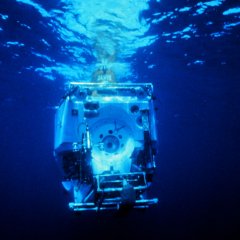World Ocean Radio - Science Science & Research6 Research

There has never been a better time to become a citizen scientist: curious individuals interested in collecting data to build toward solutions, expanding public awareness and to help develop concrete actions for the protection of the ocean. In this episode of World Ocean Radio we list some interesting examples of ocean science initiatives for the curious at heart: from penguins to clouds, phytoplankton to whales, and many other fascinating features of the ocean world.
With the Hearts in the Ice expedition set to begin one month from now, World Ocean Radio is revisiting a special episode dedicated to the upcoming 270-day exploration of the Arctic at the Bamsebu trapper’s cabin in the high north. Hearts in the Ice is a citizen science initiative that Sunniva Sorby and Hilde Falun Strom will undertake next month as a means to create a global dialogue around changes in the Polar regions that impact us all.
There has never been a better time to be a citizen scientist--those individuals interested in the collection of data toward solutions, the expansion of public awareness, to satisfy curiosity, and to help develop concrete actions for the protection of the ocean. In this episode of World Ocean Radio we provide a number of examples of ocean science initiatives for the curious at heart, whether your interest is penguins, birds, clouds, phytoplankton or any other feature of the ocean world.
This week on World Ocean Radio we introduce listeners to two women who are planning to embark on an unsupported exploration in the Arctic: 270 days at the Bamsebu trapper’s cabin in the high north. Hearts in the Ice is a citizen science initiative that Sunniva Sorby and Hilde Falun Strom will undertake in August 2019 as a means to create a global dialogue around changes in the Polar regions that impact us all. We invite you to join the conversation at heartsintheice.com.
In this episode, host Peter Neill discusses the need for more funding and energy directed toward the vast unknown ocean, and the importance of scientific endeavor and observation. And he highlights the work of the General Bathymetric Chart for the Oceans (GEBCO), a project dedicated to completing the full mapping of the world ocean by 2030.
An innovative company in Iceland has developed a product from fish skin to treat chronic wounds so that new skin can grow. Called Omega 3 Wound, developed by Kerecis Limited, and approved by the FDA, this product illustrates that we have the capacity to use 100% of the fish, thereby maximizing the value of the catch and accelerating economic opportunity around the globe.
This week we continue the Earth Optimism Series, a 24-episode project in partnership with the Smithsonian Institution's Ocean Portal, to address ocean solutions and innovative projects in the context of the Earth Optimism Summit, April 2017. In this episode, host Peter Neill discusses the need for more funding and energy directed toward the vast unknown ocean, and the importance of scientific endeavor and observation. He introduces us to the General Bathymetric Chart for the Oceans (GEBCO), a project dedicated to completing the full mapping of the world ocean by 2030.
In this fourth and final episode dedicated to outlining the complexities contained in the United Nations World Ocean Assessment, host Peter Neill focuses on the State of Oregon in the US, where a robust ocean stewardship program is in place, focusing on many of the issues and utilizing recommendations outlined in the Report.
In this third of four episodes dedicated to outlining the complexities contained in the United Nations World Ocean Assessment, host Peter Neill explores the concept of “ecosystem services” as a way to account for absent values when attempting to reconcile the balance sheet of human interaction with Nature. And he explains that activities such as offshore fishing have too many variables to be calculated by conventional measures and must be considered for their full compliment of impacts.
In this second of four episodes dedicated to outlining the complexities contained in the United Nations World Ocean Assessment, host Peter Neill explores a partial list of the ocean issues contained in the Report, and argues that this baseline document demonstrates that we know enough about ocean issues and that we have the tools and actions at our disposal to make an immediate commitment and difference in the ocean future.
In January of 2016 the UN General Assembly accepted a 1,752 page report entitled "The First Global Integrated Marine Assessment: World Ocean Assessment 1." In this episode of World Ocean Radio, host Peter Neill begins to dive into the massive ocean document and explain its contents, first by outlining its ten basic themes and subsets of issues and challenges.
The US Navy's SEALAB initiative is celebrating its 50th anniversary this year, with now three pioneering aquatic living experiments under their belts to help understand how humans can best survive in underwater conditions. In this episode of World Ocean Radio, host Peter Neill salutes the work of SEALAB, outlining their enormous contributions to the development of tools such as breathing devices and medical protections, as well as their contributions to the further understanding of the physical and psychological demands of surviving in an underwater habitat.
"Citizen Science" is a relatively new term used to describe non-specialist research carried out by pioneering teams of private individuals, foundations and organizations utilizing the power of the internet to collaborate around the globe. In this episode of World Ocean Radio, host Peter Neill will outline a number of innovative projects and a way in which anyone can collect data and conduct research using sophisticated yet affordable submersible equipment. He'll suggest that the ever-increasing interest in robotics amongst students young and old offers real potential for future ocean science.

